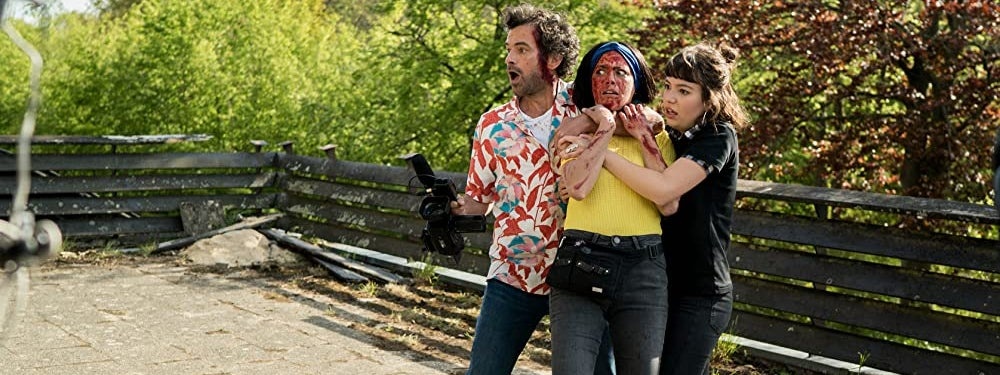Final Cut - Review
A self-aware remake of a self-aware zombie comedy.

Final Cut premiered at the Cannes Film Festival.
The 2017 Japanese zombie comedy One Cut of the Dead is so specific, in structure and execution, that the existence of a cross-cultural remake leads to a head-scratching query: What could The Artist director Michel Hazanavicius possibly do with the concept, other than “the exact same thing, but in French”? As it turns out, Final Cut offers up a surprisingly straightforward answer in its opening minutes. Ueda Shin'ichirō’s original is a self-reflexive take on a horror sub-genre well past its prime, and while the new film is equally so, it also adds an additional layer of self-awareness about its status as a remake. Neither film has anything particularly interesting to say about its chosen subject matter, but both versions prove to be light, enjoyable, and — in their best moments — downright hysterical. However, what is perhaps most surprising about Final Cut is that it’s one of the few modern remakes unequivocally enhanced by having watched the film on which it’s based.
To talk about the new version is to talk about them both, but in the interest of those who haven’t yet seen One Cut of the Dead, details that could be considered spoilers will be largely avoided. After all, Hazanavicius’s update — originally titled Z (comme Z) in French, later changed to Coupez! (or Cut!) — is a beat-for-beat re-creation of a film that switches gears a third of the way through, via a narrative and tonal rug-pull that makes for a delightful discovery. However, the nature of this shift may not be difficult to decipher this time around, since the remake also assumes the audience’s familiarity with the concept, so it begins to tip its hand much more overtly.
The story immediately plays with layers of fictional reality when, in an abandoned scientific facility, a sloppily made-up zombie (Finnegan Oldfield) attacks a helpless woman on the run (Matilda Lutz). Within seconds, a megalomaniacal director (Romain Duris) calls “cut” and begins yelling new directions at them — revealing them to be actors — as his eccentric makeup artist wife (Bérénice Bejo) begins touch-ups for the next take. It’s a movie about a zombie movie, but before long, it becomes a zombie movie itself when the director, in the interest of an absurd form of “realism,” awakens a mysterious force that begins transforming his cast and crew into undead ghouls. That’s not quite the full story either, but until more details come to light, what plays out is a silly, chaotic long-take that lasts about half an hour, before the film begins to loop back on itself in unexpected ways — or rather, in the exact ways its target audience of One Cut of the Dead fans will expect.
Not only is Final Cut up-front about its own artifice (much more so than the Japanese version), but it adds an idiosyncratic flair that hints, to anyone even vaguely aware of the original, at a much zanier bigger picture. With no initial explanation, every one of the film’s white French characters has a Japanese name — specifically, the names of characters in the original: Higurashi, Chinatsu, Hosoda, and so on — and they make straight-faced references to nearby Japanese locations, as if to respond to the “how” and “why” of this particular remake with hilariously literal answers. It appears to use the exact same script as One Cut of the Dead, translated almost word for word. The bizarre cultural optics of this dynamic are exploited for riotous laughs in a way that could not have been possible in the original, and before long, somewhere within the film’s many meta-textual layers, its in-world connection to One Cut begins to emerge (which the story eventually confirms in a manner sure to delight existing fans).
The haywire first half-hour has a much more saturated color palette than One Cut of the Dead, as if its appearance has been modeled less off Ueda’s original, and more off Zack Snyder’s remake of Dawn of the Dead. It has a frantic energy similar to Snyder’s 2004 splatter-fest, and in one of its few initial departures from One Cut, it even comments explicitly on the zombie genre’s political subtext, in ways that mirror both Snyder’s version of Dawn, as well as George Romero’s landmark 1978 original. These clunky musings land with an intentional thud, as if to draw even more attention to the fact that the film is working with pre-existing material, which it feels compelled to simultaneously update and dumb down, even at the cost of verisimilitude. It works precisely because of how much it doesn’t work. The amusing thematic misfire is the point, which the film goes on to clarify when its second act digs into the boisterous celebrity actor played by Oldfield, and his hopes for the project.
Unfortunately, the film’s awareness of (and commentary on) horror remakes is rarely more incisive than these superficial references. When it eventually zig-zags and adds more context to its minor changes, it plays less like a satire of international remakes in specific, and more like a broad fantasy about overcoming some nebulous idea of artistic stifling, with conversations between crew members that could apply to practically any creative scenario. Without this specificity, its middle portion ends up leaving a number of potentially funny situations on the table, given the many times it turns the camera back on its own premise.
Its final act proves to be as side-splitting as that of the first film.
Then again, this comedic oversight also stems from the constraints in which it’s working. As a re-purposing of something so conceptually hyper-specific, a more exacting parody of international remakes may have also required a more radical departure from the material. Instead, Final Cut finds winking reasons to follow the original to a tee, rather than taking a more novel approach. In the process, it self-reflexively excuses its own mal-formed insight into the global cinematic landscape, despite coming within inches of commenting on it on many occasions. However, the fact that it lampshades its own untapped potential does little to make up for when it occasionally misses the mark.
While this buildup is mildly unsteady, its final act proves to be as side-splitting as that of the first film; it even surpasses it in some ways, despite drawing from the same comedic well. What it loses in originality, it gains tenfold through its mischievous electronic score by Alexandre Desplat and its deft use of framing, editing and body language, which make the original’s comedic scenarios play even more ludicrously. Its expert timing is enhanced by the injection of an almost melancholy streak, turning what was already uproarious and slapstick into schadenfreude (and eventually, into something bordering on saccharine).
On the other hand, what it gains through polished sheen and professional execution ends up betraying, on some level, the micro-budget spirit inherent to its plot and its film crew characters — a spirit that was reflected by the original’s scrappy, inexpensive execution. One Cut of the Dead was made for ¥3 million (a mere $23,000), while Final Cut is directed and produced by an Oscar-winning filmmaker, and features movie stars with years of critical and commercial acclaim (a common dynamic of the remake landscape upon which it avoids touching). It isn’t an underdog production by any stretch, so its self-referential tale of underdog guerilla filmmaking can’t help but ring at least slightly hollow, despite its clear love for the form.
Ultimately, Final Cut is as much as a love letter to independent filmmaking in general as it is a specific ode to One Cut of the Dead. A common argument in the remake conversation is how new versions are often justified because they have the potential to draw eyes to their respective originals. For once, that appears to be the explicit intent, so perhaps it would have been money well-spent even if it hadn’t turned out so surprisingly, raucously fun.
The Verdict
Based on the scrappy Japanese zombie comedy One Cut of the Dead, Michel Hazanavicius’ Final Cut is a more polished version — for better and for worse — but it’s just as fun and self-reflexive, while also leaning into its remake status for a few added laughs.
Final Cut Review

